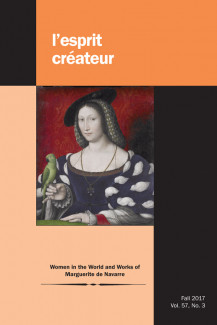
Johns Hopkins UniversityEst. 1876
America’s First Research University
Challenges of Early Modern Women

A recent special issue of L'Esprit Createur honored Régine Reynolds-Cornell, professor emerita of French at Agnes Scott College, whose research focused on women writers in the Renaissance, especially Marguerite de Navarre. Judy Kem, associate professor in the Department of Romance Languages at Wake Forest University, guest edited the issue, which developed from two sessions at the Sixteenth Century Studies Conference in San Juan, Puerto Rico, in October 2013. The essays focused on Marguerite’s role in the Querelle des femmes, an early modern debate on the status of women. Kem joined us for a Q&A on the issue.

Developing conference sessions helps to draw people from different institutions to exchange ideas on a single theme, and it gives potential contributors initial feedback from fellow scholars in order to revise and expand their papers into higher quality articles. It’s a good way to advertise a special issue as well. Most of the contributors presented on Marguerite de Navarre at the Sixteenth Century Studies Conference in Puerto Rico in October 2015. The issue came out in October 2017.
What is the most difficult part of that process?
There were no difficulties in soliciting and receiving excellent articles on Marguerite de Navarre. Scholarship on her works is a very vital area at this time with scores of scholars publishing on various aspects of her literary corpus. The theme, early modern women, is also very popular. Getting all contributors to conform to a single style could be potentially difficult, but the editors gave us clear guidelines from the very beginning.
How important is it to highlight writers who questioned social perceptions, especially those of women, so long ago?
The issue on Marguerite de Navarre deals with how women viewed authority – their own and others’ and how they dealt with New World discoveries and the changing religious landscape. Examining the challenges that early modern women encountered leads to a better understanding of our world and the values of modern society especially since women face similar challenges today.
What made L'Esprit Createur the right venue for this sort of work?
L’Esprit Créateur offered us a quick publication turn-around from conference to special issue. I recently returned from the Sixteenth Century Studies Conference (October 26-29) in Milwaukee where seiziemistes had already read the special issue. It helped generate new ideas and stimulated discussion during four more Marguerite sessions organized by Scott Francis (University of Pennsylvania) and Nicolas Russell (University of Wisconsin-Milwaukee). I was also impressed with the high quality feedback from the journal editors.


